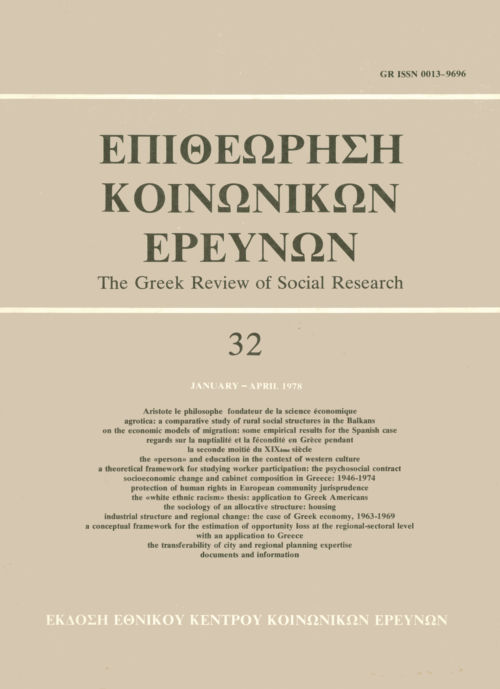Socioeconomic status and assimilation among Greek Americans
Abstract
The theory that high socioeconomic status is accompanied by
assimilation was evaluated, using a sample (N=152) of Greek
Americans from Cincinnati, Ohio. Several indicators of socioe
conomic status and assimilation were used. Contrary to man>
previous studies, the zero-order results were generally not supportive
of the status-assimilation thesis. In many instances, especially in the
case of «income» types of status, the outcomes went reverse to expectation.
However, there was more support fot the status-assimilation
thesis among the younger generations. A number of explanations,
such as cultural compatibility in regard to mobility values, ingroup
status validation processes, marginality among second-generation
ethnics, the operation of ethclass, and historical changes in the
United States, were suggested for the largely negative zero-order outcomes.
Additional research, inspired by either dialectical conflict
theory or exchange theory and using larger samples of ethnic
Americans, was recommended to further test these explanations.
Article Details
- How to Cite
-
Petropoulos, N. P. (1980). Socioeconomic status and assimilation among Greek Americans. The Greek Review of Social Research, 38, 87–95. https://doi.org/10.12681/grsr.264
- Issue
- 1980: 38
- Section
- Articles

This work is licensed under a Creative Commons Attribution-NonCommercial 4.0 International License.
Authors who publish with this journal agree to the following terms:
- Authors retain copyright and grant the journal right of first publication with the work simultaneously licensed under a Creative Commons Attribution Non-Commercial License that allows others to share the work with an acknowledgement of the work's authorship and initial publication in this journal.
- Authors are able to enter into separate, additional contractual arrangements for the non-exclusive distribution of the journal's published version of the work (e.g. post it to an institutional repository or publish it in a book), with an acknowledgement of its initial publication in this journal.
- Authors are permitted and encouraged to post their work online (preferably in institutional repositories or on their website) prior to and during the submission process, as it can lead to productive exchanges, as well as earlier and greater citation of published work (See The Effect of Open Access).




